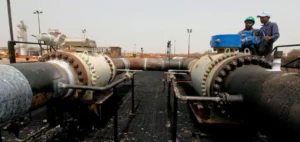Delegates from the producer group told Reuters that OPEC+ is expected to stick to its agreement to cut production by 2 million barrels per day until the end of the year, despite the drop in crude prices caused by a banking crisis that followed the collapse of two U.S. lenders.
Prices under pressure after OPEC+ decision to maintain its production cut
Oil prices hit 15-month lows on Monday. This decline is a response to the banking crisis that led to the rescue of Credit Suisse by UBS.
Brent crude oil prices traded around $75 a barrel Wednesday morning
OPEC+ members agreed last October to deep production cuts of 2 million bpd from November to the end of 2023, despite major consumers calling for increased production.
This decision helped push Brent to nearly $100 a barrel, but prices have been under pressure ever since. Indeed, the rise in interest rates to combat high inflation threatens to dampen the growth in demand for oil.
Russia’s production cut is maintained until the end of June, but not for the OPEC+ group
Russian Deputy Prime Minister Alexander Novak said Tuesday that Moscow would continue the 500,000 bpd production cut announced last month until the end of June. However, one delegate clarified that this was only a unilateral cut by Russia and that no changes were expected for the OPEC+ group until the end of the year.
The fall in oil prices is a problem for most of the group’s members because their economies are heavily dependent on oil revenues.
Experts predict higher oil prices by year’s end
According to major oil traders and hedge funds, with this OPEC+ decision to maintain the production cut, oil prices are expected to rise by the end of the year. Underlying this prediction is the relaxation of COVID-19 restrictions in China, which is increasing demand for oil from the world’s largest oil importer.
Pierre Andurand, founder of hedge fund Andurand Capital, is the most optimistic about this prediction. He predicts a potential Brent oil price of $140 per barrel by the end of the year. However, other experts are more cautious in their predictions.
Chinese oil demand growth forecast
In its latest monthly report, OPEC raised its forecast for Chinese oil demand growth this year, but maintained its projection for global demand growth at 2.32 million bpd. Analysts see this growth in Chinese demand for oil as an important factor in the rise of oil prices.
OPEC+ is scheduled to hold a virtual meeting of its ministerial committee, which includes Russia and Saudi Arabia, on April 3. It will precede a plenary ministerial meeting in Vienna on June 4. At this meeting, OPEC+ will discuss oil production cuts and their effects on market prices. The decision they make could have a significant impact on the prediction of rising oil prices.






















